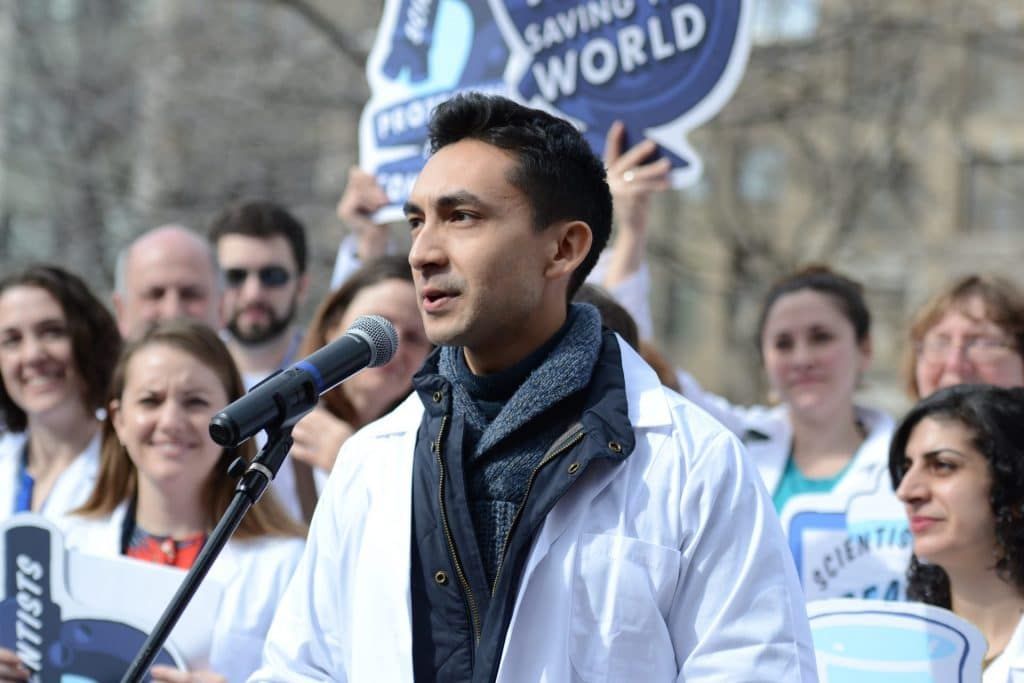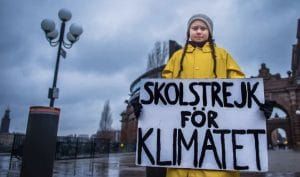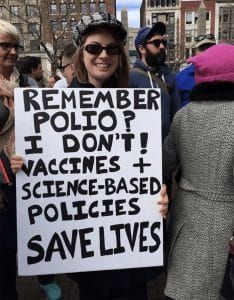From scientist to climate activist: Interview with Geoffrey Supran
By Dan Drollette Jr | May 13, 2021
 Geoffrey Supran in action. Image courtesy of Audrey Eyring/Union of Concerned Scientists
Geoffrey Supran in action. Image courtesy of Audrey Eyring/Union of Concerned Scientists
During the US presidential campaign, CNN hosted a Climate Crisis Town Hall in which moderator Anderson Cooper cited a Harvard University study while asking candidate Joe Biden a question.
The study had examined both public and private communications from ExxonMobil over the span of 40 years and found that while the company was publicly raising doubts about the evidence for climate change and its dangers, ExxonMobil scientists and executives were acknowledging the threat in private. With this information in hand, Cooper asked the candidate whether he would “hold fossil fuel corporations and executives who’ve lied to the public accountable.” (Biden said that if elected president, he would crack down on them “just like we did the tobacco industry that lied to the public, just like we did the opioid industry.”)
It was an almost surreal moment for Geoffrey Supran, one of the researchers behind the study. In a matter of a few weeks, something that he had co-authored as a postdoctoral fellow with Naomi Oreskes—a Harvard professor of the history of science—had appeared on nationwide television, the pages (and op-ed section) of the New York Times, and been picked up by the international press.
In this interview with the Bulletin’s deputy editor, Dan Drollette Jr., Supran talks about his evolution from someone who worked at the lab bench to someone leading the campaign to get MIT to divest from its investments in fossil fuel interests. “I realiz[ed] we already have most of the technologies we need to begin tackling the climate crisis, and what we truly lack is political will” he says.
Supran discusses how he conducted what was probably the first ever peer-reviewed analysis of ExxonMobil’s 40-year history of climate change communications, delves into some of the misleading tactics that fossil fuel companies use, touches on how machine learning and algorithms can be used to unearth those tactics—and explains why fossil fuel companies have shifted from outright climate change-denial to more subtle strategies of delay and blame-shifting.
(Editor’s note: This interview has been condensed and edited for brevity and clarity.)
Dan Drollette Jr.: When I read your bio on the university website, I saw that originally you were doing pure research—studying light-emitting diodes (LEDs), close cousins of photovoltaic cells. It seems like quite a jump from that to studying the climate denial, delay, and propaganda tactics of fossil fuel interests.
Geoffrey Supran: Well, yes, I suppose it could look that way; my work in materials science and engineering at MIT was basically in the area of optoelectronics and nano-photonics, where among other things I did a high-profile review of the field for Nature Photonics.
Most of my former colleagues have no idea what I’m doing now. But yeah, the way it came about was unexpected. I was just a through-and-through physicist doing this PhD; I loved science and believed in its power to make the world a better place. To be honest, I didn’t have a political or environmental bone in my body—it’s embarrassing now how little I used to even read the newspaper—but I did understand that we had a real challenge in the form of climate change and had wanted to do something about it.
But I was really taking quite a techno-centric approach to climate challenge, thinking that maybe I can invent the next techno-whiz gadget that’s going to solve this problem. And it wasn’t until about halfway through grad school—working at MIT trying to invent the new solar cell, the more efficient solar cell, the brighter LED—that I gradually came to the quite startling realization that we already have most of the technologies we need to begin tackling the climate crisis, and what we truly lack is political will.
And this was an uncomfortable realization for someone training in the physical sciences. I think that most of us scientists get into science because we want to work on the biggest, most important problems, and clearly climate change is the mother of all problems.
So, I suddenly realized I wasn’t working at the bottleneck of the issue anymore. I really had no option but to re-train, and gradually moved my focus to this question that kept coming up: Why is it we have all these technologies in our labs and in all these start-up companies, but they’re not rolling out at the scale we need commensurate with the climate crisis?

Drollette: How far along were you when you decided to switch gears? What time period are we talking?
Supran: So this was about halfway through my PhD, kind of late 2012.
As it happened, [historian of science and climate activist] Naomi Oreskes had just moved to Harvard as a professor from UC-San Diego, and I started to get into conversations with her and began to learn about this history of deception that has delayed action on climate. It caught my imagination and fired me up. I just kept moving in that direction—and the rest is history.
Drollette: Though I guess your previous work wasn’t totally unrelated…
Supran: With hindsight I think that doing that work has been really helpful to me, because I have a deep understanding of the science and technology involved—how photons go in and electricity comes out. Naomi and I have found it to be very useful in asking the big-picture questions—though I think she realized this way before I did.
Scientists are really good at diving into minute details. But every now and then it’s useful to take a few steps back and ask: “Where are we right now?” So doing that work—especially that high profile Nature Photonics review of the field—was a good early experience for that kind of approach.
Drollette: So, meeting Oreskes—a pioneer in studying the parallels between today’s climate change debate and the earlier tobacco debate—got you into this field?
Supran: Actually, what prompted this thinking was the nascent fossil fuel divestment movement just starting to pick up steam. [Climate activist and New Yorker writer] Bill McKibben was touring the country giving these terrifying mass lectures about carbon budgets, and a lab mate went to one. The next day, my lab-mate said: “What do you think? Would you like to start a fossil fuel divestment campaign at MIT?” And I was like “What’s divestment?”
Drollette: What happened next?
Supran: I did what any good scientist would do: I went home and started to read the academic literature about carbon budgets.
And frankly, they just don’t teach you this stuff in grad school. Even when you’re nominally working at the very heart of solving the problem, you don’t learn about, for example, the fact that the fossil fuels reserves already on the books of the oil and gas companies are about three-to-five times larger than the amount of carbon we can ever afford to burn. And you certainly don’t learn about the decades of climate denial and delay.
So I said “yes,” and for the next four years—2012 to 2016—I helped lead the divestment campaign at MIT. It was by thinking about how this issue might resonate with the people at MIT—a community that values scientific integrity more than anything else—that I encountered Naomi Oreskes’ really trail-blazing work on climate denial. She’d written Merchants of Doubt back in 2004, and that led to my asking her about whether we could chat about divestment.
She didn’t know about the campaign, and we started to work together. We realized we enjoy working together, and that’s how I became a research fellow with Naomi Oreskes in Harvard’s Department of the History of Science.
Drollette: In the time since then, have you noticed if people seem any more responsive to the issues you’re focused on—oil industry climate change tactics?
Supran: Yeah. And I think a number of things have evolved over the last few years as well. For one thing, we’re literally starting to see the climate crumble around us, so climate denial has begun to stick out as really ridiculous. And we’ve also seen a new generation come to the fore, that I call the “climate change generation”—such as Fridays for Future, Greta Thunberg, the Sunrise Movement, the divestment movement, Extinction Rebellion, and others. So I think that as a society, we’re becoming more alarmed, more engaged, more organized, and more diverse.

Activism has played a really central role in mobilizing that energy and engaging people in the climate crisis—and that’s been my own lived experience as well. I wouldn’t be doing the research I’m doing now if my attention hadn’t been grabbed by a grassroots movement, and that’s been at the core of my work to date.
I’m proud to call myself both a scientist and an activist, and to challenge the orthodoxy in traditional academia that the two are an oxymoron.
Drollette: Was there much resistance to what you were helping to organize at MIT? And what was it you were doing, exactly? Was it a divestment campaign or a March for Science…
Supran: It morphed into a little of both. It started out as an effort to get MIT to drop its investments in the fossil fuel industry. And MIT has a substantial lot of funds to invest—something like $15 billion. I helped lead that effort from 2012 to 2016, and it continues to this day.
It really was a hell of a ride: we collected 3,500 petition signatures from across campus, organized multiple actions and rallies, and wrote dozens of open letters with student groups, faculty members, and some of the world’s most prominent climate scientists and advocates.
We were able to push MIT’s administration to convene the institute’s first-ever climate committee—formally called the Climate Change Conversation Committee—on which I sat as a representative of the school’s graduate students. Our charge was to take the community’s pulse on what the institute should do about climate change, and after a year we voted in favor of MIT divesting itself from coal, oil, and climate change-denying companies.
I think it really did help to reignite student activism at MIT in a way that we hadn’t seen for decades, and that pattern has reproduced itself at campuses across the world. Something like half of all universities in the UK have now made various commitments to fossil fuel divestment, and worldwide commitments are now in the tens of trillions of dollars of divested funds.
And that work later blended into my involvement in the original climate march, which was 400,000 people—the biggest climate march in history, up to that time. And that led, in 2016, to myself and colleagues organizing one of the first major scientist protests against the Trump administration’s climate and energy policies. We specifically were trying to mobilize people under the banner of standing up for science, marching for science, and really standing up for the values of science as part of dealing with the problem of climate change. Our rally in Boston was just a few thousand people in Copley Square, but it drew national coverage. PBS Newshour covered our speeches, and I think that a lot of the signs that we made ended up making it to the March for Science in Washington, D.C.

Drollette: Speaking of climate change-denying companies, you and Naomi Oreskes are about to have published a paper talking about their propaganda strategies?
Supran: Yes, on Thursday, May 13, our paper is coming out in the journal One Earth, which is a new environmental science journal published by the people who make [the peer-reviewed biology journal] Cell.
Essentially it builds on our previous work, especially our 2017 study of Exxon, where we demonstrated that ExxonMobil deliberately misled the public about climate science and its implications, for decades. It was outright climate denial.
In our latest paper, we’ve focused on the gradual shift in their language from explicit climate denial to disinformation to subtler forms of propaganda, such as false advertising and greenwashing and trying to co-opt things like Earth Day. There’s been this necessary evolution of their tactics and rhetoric to account for the fact that at this point in time, they just sound too ludicrous when they blatantly deny basic science. So our new study aimed to start uncovering the more subtle tactics that they’re now taking.
Drollette: What sorts of tactics did you find?
Supran: ExxonMobil has used and continues to use rhetoric mimicking the tobacco industry to do a number of things.
First is to continue to publicly downplay the reality, but especially the seriousness, of climate change. The second is to present fossil fuel dominance as reasonable and inevitable. And the third—and we think maybe the most interesting—is to shift responsibility for climate change away from the company and onto consumers.
They’re trying to shift the blame for climate change away from those who produce and refine the fossil fuels and onto those who consume them. For example, BP created a website that calculated your “personal carbon footprint”—a term that had not existed before—and created a huge propaganda campaign to popularize it, aided and abetted by PR firms and ad agencies. And not coincidentally, its CEO tried to put a green splash on the company’s image by saying that the initials “BP” stood for “Beyond Petroleum.” [Formerly, the company was “British Petroleum;” even earlier, it was the “Anglo-Persian Oil Company.”]
To further distance themselves from the effects of their products, they even go so far as to use the term “greenhouse gas emissions” in public while referring to those same emissions as “fossil fuel emissions” in private.
Drollette: In other words, the whole thrust of their efforts is: “It’s not our fault, it’s your fault—you, the consumer.”
Supran: Exactly. And that’s really a significant finding, because although there’s been a lot of speculation of late that fossil fuel industry marketing has caused this kind of individualization of responsibility, in reality we think we can show the actual first systematic, quantitative proof of how ExxonMobil has contributed to that shift.
[There’s] a track record for this kind of approach; it was among the beverage and packaging companies, tobacco companies, and others who back in the ‘70s were behind the funding of the Keep America Beautiful campaigns, with their emphasis on recycling rather than reduction, for example. These industries were behind the coining of terms like “litterbug,” and so they really helped define the language that we use to characterize these problems and therefore the lens through which we see both the cause and the solution.
The fossil fuel industry’s ad campaigns are state of the art propaganda, developed in partnership with public relations experts and based on almost a century of collaborative experience, and they are enormously effective. In 1981, for example, Mobil internally reviewed its PR campaigns from the previous decade. They celebrated how their so-called advertorials in the New York Times “have enabled this company to become part of the ‘collective unconscious’ of the nation, as the changed views of opinion leaders have gradually molded general public opinion.” They concluded that their ads were so effective that they’d even changed the viewpoints of the Times’ editorial board itself. Independent social psychologists have also experimentally demonstrated that ExxonMobil’s advertorials substantially affected what the general public considers to be the most prominent or important part of the issue of climate change.
I think one of the most significant things about the new work we’re doing is that it starts to tap into these much more subtle but subversive forms of “delayism,” as we call it, which have an ability to get under the radar and groom the way policy makers, the public, and scholars think about this problem. We all like to think that we are immune to propaganda and marketing, but the blunt answer is they wouldn’t spend billions of dollars doing this stuff if it didn’t work. They [the fossil fuel companies] are testing this stuff, they are honing and refining the messaging, and we see the consequences, the fallout of this, all around.
So for example, today’s narrative focus on personal responsibility has been pervasive in shaping the agendas of many scholars and policy makers and much of the public. Yale University, for instance, refuses to divest from fossil fuel companies because it says that it is the consumption of fossil fuels and not the production of fossil fuel that’s the cause of climate change. Even the Paris Climate Agreement doesn’t actually mention fossil fuels, even though they are the cause of global warming.
Drollette: You’ve said that you can show “systematic, quantitative proof”? How do you do that?

Supran: Basically, our work is based on established social science methods of content analysis—manual approaches to systematically looking at text. And in this new study, we’ve taken this a step further; for the first time, we use statistical techniques from the field of computational linguistics to minimize the subjective judgments that are inevitable when you look at language. And also, to identify patterns that may otherwise be hiding in plain sight.
In doing this, we’re taking a leaf from the pages of scholars who have studied the rhetoric of the tobacco industry, and applying that to ExxonMobil’s discourse.
In a nutshell, this analysis is the first computational assessment of how ExxonMobil has used language to subtly yet systematically shape the public discourse about climate change. So it’s a natural next step in our research, both in terms of following the evolution of the fossil fuel industries rhetoric, but also it’s an evolution methodologically.
To give you a sense of our methods, we use machine learning tools to identify key topics that Exxon spoke about publicly and privately, and then we use other algorithms to statistically compare how often terms and topics appeared in one set of documents versus another. And such tools are vital; after all, the volume of material we’re dealing with is huge; the tobacco trials resulted in tens of thousands of documents. And this basically allows us to find patterns that have until now, we think, gone unnoticed when it’s come to talking about climate change.
Drollette: So, using ExxonMobil as a typical example, the fossil fuel companies are trying to affect our perceptions of who is responsible for climate emissions and climate change? And by doing so, tilt the table so that they get off the hook—or at least delay action on remedying climate change as long as possible?
Supran: Right.
Drollette: And I guess it’s also going to ultimately affect who foots the bill for dealing with climate change?
Supran: Exactly.
And I think that it’s really important to learn from our collective past experience with big tobacco. Our study demonstrates, in quite specific detail, the very specific rhetorical tools that the fossil fuel industry—ExxonMobil—has drawn directly from the playbook of big tobacco, both in terms of public relations and as a legal tool to offset responsibility to its consumers.
And we’re seeing this play out in real time.
In 2018, a Chevron lawyer defending Exxon in a California climate lawsuit specifically argued that the blame for greenhouse gas emissions is not on the producers, it’s on the consumers, the people living their everyday lives. And the exact language that ExxonMobil has been using—concepts of risk, of demand, of consumer responsibility—these are all terms co-opted from the tobacco industry discourse.
And we all know how that played out and how long it took to hold them accountable.
In a way, the proof is in the history, and the very fact that for decades journalists were essentially tricked by these denial campaigns into giving full-banner coverage to climate denial and delay rhetoric. It really demonstrates that these techniques work—and that they have an ability to get under our skin.
Together, we make the world safer.
The Bulletin elevates expert voices above the noise. But as an independent nonprofit organization, our operations depend on the support of readers like you. Help us continue to deliver quality journalism that holds leaders accountable. Your support of our work at any level is important. In return, we promise our coverage will be understandable, influential, vigilant, solution-oriented, and fair-minded. Together we can make a difference.
Keywords: Disinformation, March for Science, activism, climate change, climate crisis, climate delay, climate denial, divestment, emissions, fossil fuel, global warming
Topics: Climate Change














